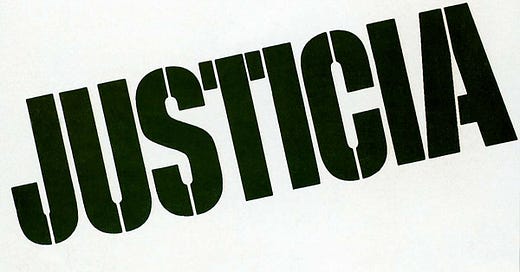Welcome to day one of my December challenge to listen to an album a day! Note: All hyperlinked songs go to Spotify links, Youtube links can be found at the end of the post.
I started the month strong with Eddie Palmieri’s 1969 record “Justicia.” My first introduction to this album was while researching for a course, I wanted to explore salsa music and its advent in New York City. “Justicia” was a shining example of the Puerto Rican and Cuban influences that co-mingled in NYC to give us a sound we now associate with the Hispanophone world.
“Justicia” offers us more than the inherent mixing of traditional Caribbean sounds we expect from salsa, but also the influence of jazz and soul from the late 60s. On the precipice of the 70s, Palmieri gifted his listeners a musical journey that speaks to the complicated realities of life as a Boricua in New York. The title track of this album, traditional in Afro-Caribbean sound, is far from traditional in its lyrics. “Justicia” asks “¿Cuándo llegará?, ¿cuándo llegará? Justicia pa' los boricuas y los niches” or “When will it come? When will it come? Justice for the boricuas and the Black Americans.” Artists across genres were all seeking answers to questions about race, Vietnam, and the social condition of minorities in the US. Palmieri like several other artists from Fania and Tico, took his moment to ask the question and reckon with the reality Puerto Ricans in NYC were living through. What makes his message even more impactful for me, is the willingness to see the struggle of Black Americans and Puerto Ricans as inherently linked.
The album in full brought up a few words/ideas for me. Physicality, passion, dissonance, grit, and beauty. The tone of the piano felt rough to my ears. That might not be the best descriptor, but it made even the most beautiful tracks on this album like “Somewhere” and “ Amor Ciego” feel more authentic, more like they were coming from a community that works with what it has and is still beautiful despite its tone. “Justicia” also has the classic trombone usage known as “trombonga” which NYC salsa from the 60s and 70s is so known for. The usage of the trombone gives this album and many of its counterparts the distinct grit inherent in city life.
My four favorite tracks, in no particular order, were…
“My Spiritual Indian”
“Lindo Yambú”
“Everything is Everything”
“The Verdict on Judge Street”
“Everything is Everything” has been my favorite for a while, for its tempo and intensity as well as the vocals, which are sung in English by Palmieri himself. David Hersher’s bass playing has made this one of my favorite songs to drive to.
“My Spiritual Indian” and “The Verdict on Judge Street” show Palmieri’s jazz abilities and ventures into the avant-garde. The latter song has a youthful and fun quality as it waltzes along in the beginning before the band shows its freedom and range. I enjoyed the solos on both tunes and wished more pianists in the jazz world would check out his music. I think “latin” music gets pigeonholed in the jazz world. It’s understood only in its simplest form, and perhaps even understood as less intelligent, which couldn’t be further from the truth. There is so much more than the basic bossa nova students learn and calve patterns. Afro-Caribbean music features thoughtful improvisation and brilliant uses of rhythm Palmieri puts on display throughout the album but on these two tracks in particular. Afro-Caribbean or “Latin” music isn’t a stylistic choice or feel you throw on to liven something up, it is a legacy and tradition with its language and nuances.
I’m glad to have revisited this album today, one I hadn’t listened to in completion more than once or twice. It felt like a natural place to start, something that I wanted to hear, which goes back to the intention of doing this challenge at all.
For anyone wanting more information about personnel and the tracks, Fania has a great article on it here.
Listen to all of “Justicia” on YouTube.
Until Tomorrow,
Emily





Never listened to this but I will now!